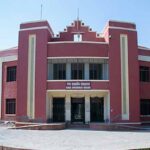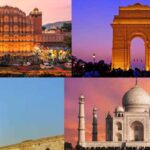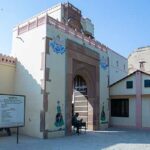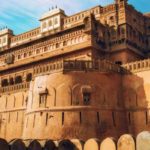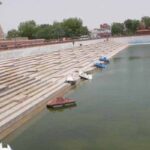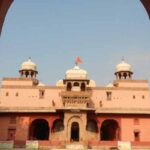Bikaner Travel Information, a vibrant city located in the northwestern state of Rajasthan, India, is a treasure trove of history, culture, and architectural marvels. With its majestic forts, intricate palaces, and colorful festivals, Bikaner has become a popular tourist destination. Let’s delve into the captivating world of Bikaner tourism.
One of the main attractions of Bikaner is the Junagarh Fort, a magnificent structure built in the 16th century. This imposing fort showcases a brilliant blend of Rajput and Mughal architectural styles, with its ornate balconies, courtyards, and exquisitely decorated chambers. Inside the fort, visitors can explore the various museums displaying an impressive collection of artifacts, weaponry, and artwork, giving them a glimpse into the opulent lifestyle of the erstwhile rulers of Bikaner.
The city is also famous for its havelis, intricately designed mansions adorned with beautiful frescoes and carvings. The havelis of Bikaner, such as Rampuria Haveli and Kothari Haveli, are architectural marvels that showcase the artistic brilliance of the bygone era.
Bikaner is synonymous with its delectable culinary offerings, particularly the famous Bikaneri bhujia, a spicy snack made of gram flour. Visitors can explore the local markets and indulge in the rich flavors of Bikaneri sweets and snacks. The city also hosts the annual Bikaner Camel Festival, where tourists can witness the vibrant culture of Rajasthan, including camel races, folk dances, and traditional music performances Bikaner Tour Packages.
For nature enthusiasts, a visit to the Gajner Wildlife Sanctuary is a must. This sanctuary is home to a diverse range of flora and fauna, including migratory birds, blackbucks, and desert foxes. Visitors can embark on a thrilling safari or enjoy a serene boat ride in the picturesque Gajner Lake, surrounded by the stunning beauty of the Thar Desert.
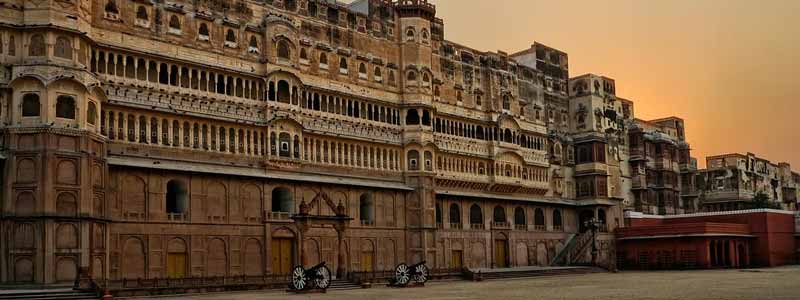
History of Bikaner
The history of Bikaner dates back to the late 15th century when it was founded by Rao Bika, a Rathore prince and the son of Rao Jodha, the founder of Jodhpur. Rao Bika, driven by a desire for independence, decided to establish his own kingdom and selected the barren wilderness of the Thar Desert as the site for his new capital. In 1488, he laid the foundation of the city and named it Bikaner after himself.
Under the rule of Rao Bika and his descendants, Bikaner gradually grew in prominence and became a flourishing center of trade and commerce. The strategic location of the city along the ancient caravan routes contributed to its prosperity, as it became an important stopover for merchants traveling between Central Asia and Gujarat.
In the early 16th century, Bikaner faced numerous invasions and conflicts from neighboring kingdoms. However, the rulers of Bikaner successfully defended their territory and expanded their kingdom. One of the most notable rulers of Bikaner was Raja Rai Singh, who ascended the throne in 1571. He was a renowned warrior and diplomat who served under the Mughal emperor Akbar and played a key role in expanding the Mughal Empire.
During Raja Rai Singh’s reign, Bikaner witnessed a period of cultural and architectural brilliance. He built several impressive structures, including the Junagarh Fort, which remains one of the city’s most iconic landmarks. The fort was constructed between 1589 and 1594 and served as the royal residence for generations of Bikaner rulers.
Bikaner continued to prosper under subsequent rulers, who further embellished the city with magnificent palaces, temples, and havelis. However, like other princely states, Bikaner came under British suzerainty in the 19th century. The city remained a part of the Rajputana Agency, which was a collective administrative unit for various princely states in the region.
After India gained independence from British rule in 1947, Bikaner, along with other princely states, acceded to the Dominion of India. It eventually became a part of the state of Rajasthan when the state reorganization took place in 1950.
Today, Bikaner stands as a testament to its rich history and cultural heritage. Its magnificent forts, palaces, and havelis attract tourists from around the world, offering a glimpse into the glorious past of this desert city. Bikaner continues to thrive as a major center for trade, tourism, and the preservation of Rajasthani traditions and customs.
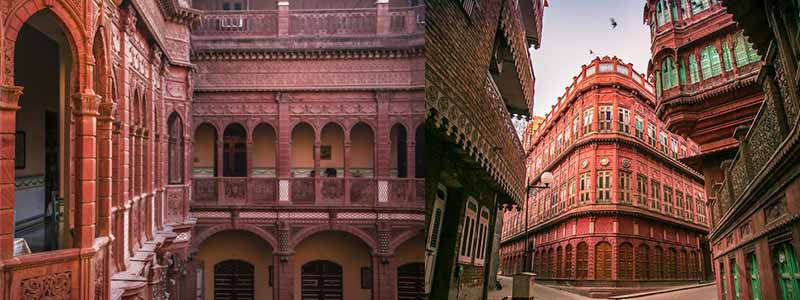
Places to Visit in Bikaner
Bikaner, a city rich in history and culture, offers a plethora of fascinating attractions for visitors to explore. Here are some of the must-visit places in Bikaner:
Junagarh Fort: This majestic fort, built in the 16th century, is one of the prime attractions of Bikaner. With its stunning architecture and intricate artwork, the fort showcases a blend of Rajput and Mughal styles. Inside, visitors can explore the various palaces, courtyards, and museums that house an impressive collection of artifacts.
Lalgarh Palace: Constructed in the early 20th century, Lalgarh Palace is a splendid example of Rajput architecture. The palace boasts intricate latticework, exquisite filigree work, and magnificent marble carvings. It also houses a museum that displays a remarkable collection of photographs, artifacts, and antiques.
Karni Mata Temple: Located in the nearby town of Deshnok, the Karni Mata Temple is renowned for its unique inhabitants—thousands of sacred rats. Devotees visit the temple to seek the blessings of Karni Mata, the incarnation of the Hindu goddess Durga. The sight of rats roaming freely within the temple premises is considered auspicious.
Rampuria Havelis: Bikaner is famous for its splendid havelis, and the Rampuria Havelis are among the most impressive. These grand mansions feature exquisite architecture, intricately carved facades, and beautiful frescoes depicting mythological and historical themes. A stroll through the narrow lanes of the old city will reveal many such havelis.
Gajner Palace and Wildlife Sanctuary: Situated on the banks of the scenic Gajner Lake, the Gajner Palace is a former royal hunting lodge that has been converted into a heritage hotel. The palace offers a unique experience of regal luxury amid serene surroundings. The adjoining Gajner Wildlife Sanctuary is home to diverse flora and fauna, making it a great spot for nature lovers.
National Research Centre on Camel: Bikaner is known for its association with camels, and a visit to the National Research Centre on Camel provides insight into the rich cultural significance of these magnificent creatures. Visitors can learn about camel breeding, milk production, and various research activities conducted at the center.
Bhandasar Jain Temple: This beautiful 15th-century temple is dedicated to the fifth Tirthankara of Jainism, Sumatinath Ji. It is renowned for its exquisite architecture, intricate carvings, and vibrant frescoes. The temple is an important pilgrimage site for Jains and attracts devotees and tourists alike.
Camel Festival: If you happen to visit Bikaner in January, don’t miss the Camel Festival. This annual event showcases the rich cultural heritage of the region with camel races, performances of folk dances and music, and other traditional activities. It is a colorful extravaganza that offers a glimpse into the desert way of life.
These are just a few of the many attractions that Bikaner has to offer. The city’s vibrant markets, delicious street food, and warm hospitality further add to the overall experience, making it a truly memorable destination.
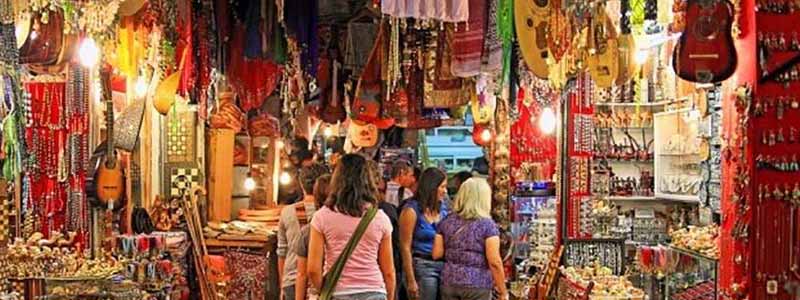
Famous Shopping Markets in Bikaner
Bikaner is a haven for shopaholics, offering a delightful array of markets and bazaars where you can find a variety of traditional handicrafts, textiles, and local specialties. Here are some of the famous shopping markets in Bikaner:
Kote Gate Market: Located near the historic Junagarh Fort, Kote Gate Market is a bustling shopping hub in Bikaner. It offers a wide range of items, including textiles, handicrafts, jewelry, and traditional Rajasthani attire. You can find colorful fabrics, embroidered textiles, camel leather items, and camel hair products.
Station Road Market: As the name suggests, Station Road Market is situated near the Bikaner railway station. It is a vibrant market known for its textiles, particularly the famous Bikaneri sarees and dupattas. You can also find traditional Rajasthani jewelry, handicrafts, and local snacks like Bikaneri bhujia.
Mahatma Gandhi Road: Also known as MG Road, this bustling street is lined with shops and stalls selling a variety of items. You can find traditional Rajasthani artifacts, handcrafted items, colorful bangles, pottery, and embroidered fabrics. It is also a great place to shop for local spices, sweets, and snacks.
Khadi Bhandar: Located near the Junagarh Fort, Khadi Bhandar is a popular destination for eco-friendly and handwoven textiles. The store offers a range of products made from Khadi fabric, including clothing, accessories, and home furnishings. It is a great place to support local artisans and shop for sustainable products.
Bada Bazaar: Bada Bazaar is one of the oldest and busiest markets in Bikaner. It is known for its vibrant atmosphere and a wide variety of goods. You can explore shops selling textiles, handicrafts, jewelry, footwear, and decorative items. The market is particularly famous for its traditional mojari shoes, which are intricately embroidered.
Sadul Singh Market: Located near the Lalgarh Palace, Sadul Singh Market is a popular shopping destination for tourists. It offers a mix of traditional Rajasthani crafts, clothing, and accessories. You can find beautifully crafted silver jewelry, lacquerware, miniature paintings, and camel leather products.
King Edward Memorial Road: King Edward Memorial Road, commonly known as KEM Road, is a bustling market that offers a range of shops and stores. It is known for its textiles, including tie and dye fabrics, bandhani (tie-dye) sarees, and block-printed textiles. You can also find traditional embroidered quilts, home decor items, and Rajasthani artifacts.
These shopping markets in Bikaner provide a unique opportunity to indulge in retail therapy while immersing yourself in the rich culture and heritage of the region. Whether you’re looking for souvenirs, traditional attire, or local handicrafts, these markets offer a vibrant and colorful shopping experience.
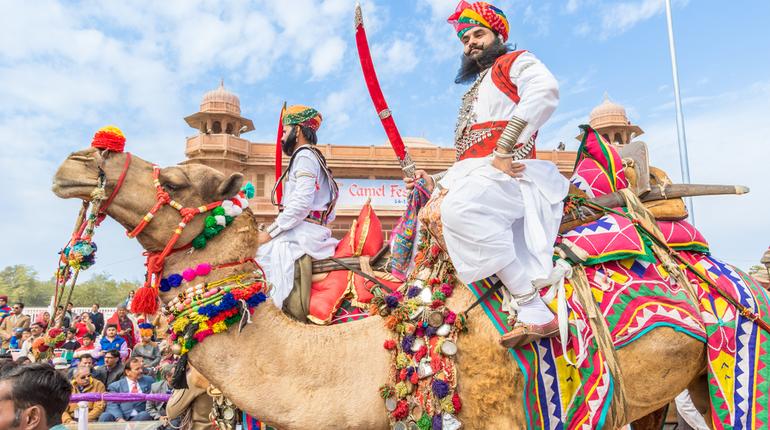
Festivals of Bikaner
Bikaner, known for its rich cultural heritage, celebrates several vibrant festivals throughout the year. These festivals showcase the region’s traditional music, dance, art, and religious rituals. Here are some of the major festivals of Bikaner:
Camel Festival: The Camel Festival, held annually in January, is one of the most popular festivals in Bikaner. It celebrates the indispensable role of camels in the desert life of Rajasthan. The festival features camel races, beauty contests, camel performances, and even camel polo matches. Cultural performances, folk dances, music, and fireworks add to the festive atmosphere.
Gangaur Festival: Celebrated in March-April, Gangaur Festival is dedicated to the goddess Gauri, an incarnation of Parvati, the wife of Lord Shiva. The festival is particularly significant for married women who pray for the well-being and longevity of their husbands. Women dress in traditional attire, wear beautiful jewelry, and carry colorful idols of Gauri in a procession through the streets of Bikaner.
Karni Mata Fair: Held twice a year, in March-April and September-October, the Karni Mata Fair takes place at the Karni Mata Temple in Deshnok, near Bikaner. Devotees from far and wide gather to seek the blessings of Karni Mata, the goddess believed to be an incarnation of Durga. The temple is renowned for its population of sacred rats, which are considered auspicious.
Kolayat Fair: The Kolayat Fair is held in the town of Kolayat, about 50 kilometers from Bikaner, in the month of Kartik (October-November). Devotees take a holy dip in the Kolayat Lake, believed to be sacred, and offer prayers to the Hindu deity Kapil Muni. The fair attracts a large number of pilgrims who participate in religious rituals and cultural events.
Kapil Muni Fair: The Kapil Muni Fair is another significant fair celebrated in Bikaner, dedicated to the sage Kapil Muni. It takes place at the Kapil Muni Temple in Kolayat during the month of Phalgun (February-March). Devotees throng the temple, perform rituals, and take part in cultural programs, including folk dances and music.
Nagaur Fair: Although not in Bikaner city, the Nagaur Fair is a major event held in the nearby town of Nagaur, attracting visitors from Bikaner and beyond. It is one of the largest cattle fairs in Rajasthan, where livestock traders gather to buy and sell animals such as camels, horses, and cows. The fair also features exciting competitions, including tug-of-war, camel races, and bullock races.
These festivals of Bikaner are a vibrant celebration of the region’s culture, traditions, and religious fervor. They provide a wonderful opportunity for tourists to immerse themselves in the colorful festivities and experience the rich heritage of Rajasthan.
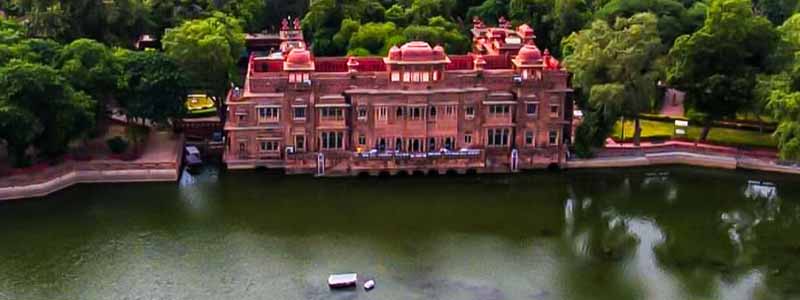
Best Time to Visit Bikaner
The best time to visit Bikaner is during the winter months, from October to March, when the weather is pleasant and suitable for outdoor activities and sightseeing. Here’s a breakdown of the seasons in Bikaner:
Winter (October to March): Winter is the most favorable time to visit Bikaner. The weather during this period is generally cool and pleasant, with temperatures ranging from 10°C (50°F) to 25°C (77°F) during the day. It is ideal for exploring the city’s attractions, including forts, palaces, and markets, without being bothered by scorching heat. It is also the festival season, with colorful events like the Camel Festival and Gangaur Festival taking place.
Summer (April to June): Bikaner experiences scorching hot summers, with temperatures soaring above 40°C (104°F) during the daytime. The months of April and May are particularly harsh, with temperatures often crossing 45°C (113°F). The intense heat makes it uncomfortable for outdoor activities and sightseeing. If you plan to visit during summer, it is advisable to carry light cotton clothing, sunscreen, and stay hydrated.
Monsoon (July to September): Bikaner receives limited rainfall during the monsoon season. The months of July and August experience occasional showers, bringing relief from the heat. However, the rainfall is erratic, and the city remains mostly dry. The temperatures during this time range from 25°C (77°F) to 35°C (95°F). While the landscape becomes greener, it may not be the best time for outdoor activities due to the unpredictable weather.
Overall, the winter months of October to March are the most pleasant and comfortable for visiting Bikaner. The favorable weather allows for enjoyable exploration of the city’s attractions and participation in festivals. However, it is important to note that winter is also the peak tourist season, so popular sites and accommodations may be crowded. If you prefer a quieter experience, visiting in the shoulder months of October-November and February-March can be a good option.
How to Reach Bikaner
Bikaner, located in the northwestern state of Rajasthan, India, is well-connected by various modes of transportation. Here’s a guide on how to reach Bikaner:
By Air: The nearest airport to Bikaner is Jodhpur Airport, which is approximately 250 kilometers away. It is well-connected to major Indian cities like Delhi, Mumbai, Jaipur, and Udaipur. From the airport, you can hire a taxi or take a bus to reach Bikaner.
By Train: Bikaner Junction is the main railway station in the city and is well-connected to major cities in India. Several trains run to and from Bikaner, including express and superfast trains. You can check the availability of trains and book tickets through the Indian Railways website or other online travel portals.
By Road: Bikaner is well-connected by road to major cities in Rajasthan and other neighboring states. The Rajasthan State Road Transport Corporation (RSRTC) operates regular bus services from cities like Jaipur, Jodhpur, Delhi, and Ahmedabad to Bikaner. Private taxis and car rentals are also available for a more comfortable and flexible journey. The road network in Rajasthan is well-maintained, making road travel a convenient option.
By Bus: Bikaner has a well-developed bus network that connects it to various cities within Rajasthan and neighboring states. You can find both state-run and private buses operating regular services to and from Bikaner. The bus station in Bikaner is located near the railway station, and tickets can be purchased at the counters or through online portals.
Within the City:
Once you reach Bikaner, getting around the city is relatively easy. Auto-rickshaws, cycle-rickshaws, and taxis are available for local transportation. Some tourist attractions in Bikaner are within walking distance of each other, making it convenient to explore the city on foot.
It is advisable to check the schedules, book tickets in advance (if required), and plan your travel according to your preferences and convenience.

